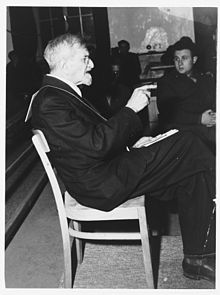- Claus Schilling
-
Claus Karl Schilling (5 July 1871, Munich – 28 May 1946, Landsberg am Lech), also recorded as Klaus Schilling, was a German tropical medicine specialist, particularly remembered for his infamous participation in the Nazi human experiments at the Dachau concentration camp during World War II.
Though never a member of the Nazi Party and a recognized researcher before the war, Schilling became notorious as a consequence of his enthusiastic participation in human research under both Fascist Italy and Nazi Germany. From 1942 to 1945, Schilling's research of malaria and attempts at fighting it using synthetic drugs resulted in over a thousand cases of human experimentation on camp prisoners.
Sentenced to death by hanging after the fall of Hitler's Germany, he was executed for his crimes against the Dachau prisoners in 1946.
Contents
Biography
Born in Munich on July 5, 1871, Schilling studied medicine in his native city, receiving a doctor's degree there in 1895. Within a few years, Schilling was practicing in the German colonial possessions in Africa. Recognized for his contributions in the field of tropical medicine, he was appointed the first-ever director fo the tropical medicine division of the Robert Koch Institute in 1905, where he would remain for the subsequent three decades.
Italian research
Upon retirement from the Robert Koch Institute in 1936, Schilling moved to Benito Mussolini's Fascist Italy, where he was given the opportunity to conduct immunization experiments on inmates of the psychiatric asylums of Volterra and San Niccolò di Siena.[1] (The Italian authorities were concerned that troops faced malarial outbreaks in the course of the Italo-Ethiopian War.) As Schilling stressed the significance of the research for German interests, the Nazi government of Germany also supported him with a financial grant for his Italian experimentation.[1]
Dachau experiments
Schilling returned to Germany after a meeting with Leonardo Conti, the Nazis' Health Chief, in 1941, and by early 1942 he was provided with a special malaria research station at Dachau's concentration camp by Heinrich Himmler, the leader of the SS. Despite negative assessments from colleagues, Schilling would remain in charge of the malaria station for the duration of the war.[1]
Although in the 1930s Schilling had stressed the point that malaria research on human subjects could be performed in an entirely harmless fashion, the Dachau subjects included experimentees who were injected with synthetic drugs at doses ranging from high to lethal. Of the more than 1,000 prisoners used in the malaria experiments at Dachau during the war, between 300 and 400 died as a result; among survivors, a substantial number remained permanently damaged afterward.[1]
In the course of the Dachau Trials following the liberation of the camp at the close of the war, Schilling was tried by an American tribunal, with an October 1945 affidavit from Schilling being presented in the proceedings.[2]
The tribunal sentenced Schilling to death by hanging on December 13, 1945. His execution took place at Landsberg Prison in Landsberg am Lech on May 28, 1946.
References
- ^ a b c d Hulverscheidt, Marion. "German Malariology Experiments with Humans, Supported by the DFG Until 1945". Man, Medicine, and the State: The Human Body as an Object of Government Sponsored Medical Research in the 20th Century, Beiträge zur Geschichte der Deutschen Forschungsgemeinschaft Volume 2. Ed. Wolfgang Uwe Eckhart. Stuttgart: Franz Steiner Verlag, 2006. ISBN 351508794X, ISBN 9783515087940. Pp. 221-236.
- ^ Spitz, Vivien. Doctors from Hell: The Horrific Account of Nazi Experiments on Humans. Boulder, Colorado: Sentient Publications, 2005. ISBN 1591810329, ISBN 9781591810322. P. 105.
Categories:- 1871 births
- 1946 deaths
- Dachau concentration camp personnel
- Dachau Trials executions
- German scientists
- Nazi human experimentation
- People from Munich
- Nazi physicians
- Holocaust perpetrators
Wikimedia Foundation. 2010.

